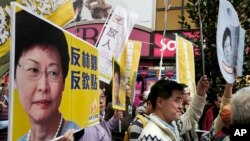A Beijing-backed panel will gather next Sunday to select the next leader for this city of 7.3 million people. The vote follows several years of unrest and uncertainty in the former British colony.
Although the 1,194 voting members of the Election Committee will cast secret ballots, observers say China has already made clear which of the three candidates it prefers and has even issued a veiled warning through pro-Beijing media that the committee should not trigger a constitutional crisis by voting against the choice of the central government.
The risk of that happening ought to be small. A little more than a quarter of the body derives from the pro-democracy camp, which has decided to vote as a bloc. The other three-quarters of the committee are controlled by Beijing.
The leading candidate is former chief secretary Carrie Lam Cheng Yuet-ngor, a career civil servant who stepped down as the city’s number-two official in order to run and is widely believed to be Beijing’s preferred candidate. Critics call her “C.Y. 2.0” and she already has negative poll ratings, below even those of current chief executive C.Y. Leung when he assumed office.
The second choice is the more laid-back and popular John Tsang Chun-hwa, a mustachioed former financial secretary who also resigned his cabinet post to be a candidate. He’s been nicknamed Pringles for his resemblance to a potato chip logo.
The third candidate is retired judge Woo Kwok-hing, a surprise entrant with no government experience. Hong Kong’s pan-democratic groups do not back him even though his positions on issues may be the closest to theirs.
Ronny Tong, a former legislator who now heads the Path of Democracy think-tank, told VOA in an online interview that he doubts if any of the three candidates could be popularly accepted.
“Look at the way Carrie (Lam) is being vilified every day. Go to her (Facebook) page and you will see the opposition is so much greater than when C.Y. was elected. On the other hand, John Tsang is not getting any support from the pro-government people or Beijing, and I fear if he gets elected we may face a greater constitutional crisis -- divided over where we are going, over how One Country-Two Systems should go on -- (and) everything Beijing stands for the pan-democrats will oppose,” he said.
One Country-Two Systems is the China-approved constitutional arrangement under which Hong Kong is allowed a capitalist system, the Common Law legal system and a high degree of autonomy.
The winning candidate must get at least 601 votes, one more than half the official size of the 1,200-member election committee. Leung received 689 votes in his election, a number that became his pejorative nickname thereafter. The pan-democrats hold some 325 votes on the election body. In the absence of a truly popular mandate, Beijing wants Lam to secure no less than 700 votes and preferably more than 800 in order to have a victory that appears convincing.
Leverage
David Zweig, chair professor of social science at the Hong Kong University of Science and Technology and a longtime analyst of politics here, said this small-circle method of choosing the territory’s leader has little to do with a free election.
“The population in general has very little leverage on the candidates because it doesn’t really matter what the population thinks about them. You want to please these 1,200 people and you want to please 800 of them if you want to have a decent electoral victory and that’s it.”
Zweig says Lam appears to have been all but anointed as victor in the pro-Beijing news media, making it likely that she will carry the day.
Tsang’s chances as a challenger recently took a major hit. Some thought tycoon Li Ka-shing, who controls numerous votes through his family, affiliated businesses and friends, might vote with the pan-democratic bloc, giving Tsang a shot at victory. But the Li group recently indicated that it’s supporting Lam.
The worry that Tsang won’t deliver also puts him at a disadvantage, said Jean-Pierre Cabestan, head of the Political Science Department and professor at Hong Kong Baptist University
“Clearly, John Tsang is more of a unifier. Now the trouble is whether he will be able to deliver. He has made some promises in terms of relaunching the political reform platform and trying to convince Beijing to be more flexible” on universal suffrage – pledges that China may not support, the professor said.
Zweig said Lam has benefited from Beijing’s arm-twisting.
“People were definitely pressured. The central government in Beijing, as far as we know, has put pressure on lots of people in the committee to vote for Carrie, because they prefer Carrie and Carrie wants to be able to get at least 800 votes of this 1,200.”
Political reform plan
Under Beijing’s political reform plan, which sparked months of street protests and was rejected by the Hong Kong legislature in 2014, China would have controlled the process of selecting candidates, but these nominees would have then had to stand in a general election by universal suffrage.
Zweig said any further discussion of reform appears off the table.
“My contacts, people that I know who work in Hong Kong for the government in Beijing, make it very clear that there will be no discussion within the next five years and that as far as they’re concerned the democrats shut the door on what Beijing saw as some gradual progress.”
But Tong, who formerly belonged to the pro-democratic Civic Party, disagrees.
“Don’t underestimate the value of the process of trying to restart political reform, “he said. “If we do it in a rational way and start engaging each other, it will improve relations, even if we ultimately will fail.”






